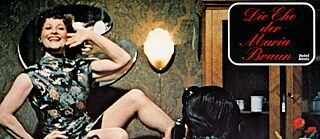Film Screening
The Marriage Of Maria Braun

70 Years of German Films
The anniversary film series shows some of the most successful German films of the last seven decades.
THE MARRIAGE OF MARIA BRAUN
Die Ehe der Maria Braun
Director: Rainer Werner Fassbinder
Year: 1978
Runtime: 120 min
Screenplay: Peter Märthesheimer, Pea Fröhlich
Cinematography: Michael Ballhaus
Editors: Rainer Werner Fassbinder (as Franz Walsch), Juliane Lorenz
Cast: Hanna Schygulla, Klaus Löwitsch, Ivan Desny
Festivals and Awards:
Berlin International Film Festival 1979 (Competition)
The 1970s were Rainer Werner Fassbinder’s decade. As gifted as he was capricious, the wunderkind director from Munich initially attracted attention with his Action-Theater and later the antitheater at the end of the 1960s. He soon also started making films – often three or four a year – with his ensemble of actors, musicians, and set designers whom he made seemingly literally dependent on him for life. Fassbinder learnt filmmaking by watching films – he was particularly impressed by the great melodramas of the German-Danish Hollywood director Douglas Sirk – and just by making them. “Make many films so that my life can become a film, “ is written on the memorial stone in his hometown of Bad Wörishofen. And there were over 40 of them when he died in 1982 at the age of just 37.
Fassbinder, who was able to portray German history of the 20th century so vividly, flamboyantly, bitingly, colourfully, painfully, lovingly, gaudily and critically like no other, enjoyed his biggest success in 1978: THE MARRIAGE OF MARIA BRAUN with his favourite actress Hanna Schygulla took a very special and unprecedented look at the life of a German woman in West Germany after the Second World War. Maria’s husband, who has been reported missing, suddenly turns up and finds his wife in the arms of a black American soldier. Maria kills the soldier, but her husband takes the blame by going to prison. During this time, Maria isn’t going out collecting rubble – she’s making a career for herself. Using the resources of the system that will later be celebrated as the motor of the economic miracle.
Fassbinder isn’t wanting to tell the story of a heroine, but rather presents the actions of a strong, yet vulnerable woman taking her fate into her own hands as a great historical and above all human melodrama (screenplay: Peter Märthesheimer) with stunning images (camera: Michael Ballhaus), exceptional costumes (Barbara Baum), unique production design (Norbert Scherer) and outstanding actors: Klaus Löwitsch, Ivan Desny, Gisela Uhlen, Günter Lamprecht, Gottfried John and, above all, Hanna Schygulla in the title role. She won the Silver Bear for Best Actress at the Berlinale in 1979.
Fassbinder ended what was his most creative decade with this film after such masterpieces as THE MERCHANT OF FOUR SEASONS (1971), MARTHA (1973), ALI: FEAR EATS THE SOUL (1974) and IN A YEAR OF 13 MOONS (1978). The 80s then began, of course, with his passion project: BERLIN ALEXANDERPLATZ based on the novel by Alfred Döblin. The film genius Rainer Werner Fassbinder finally got to grips with the novel that had been such a part of his life in the form of a 14-part television series. And how!
Details
ByTowne Cinema
325 Rideau St
Ottawa ON K1N 5Y4
Kanada
Language: Original version with English subtitles
Price: General entry: 14,99 CAD
film-montreal@goethe.de
Part of series 70 Years of German Films